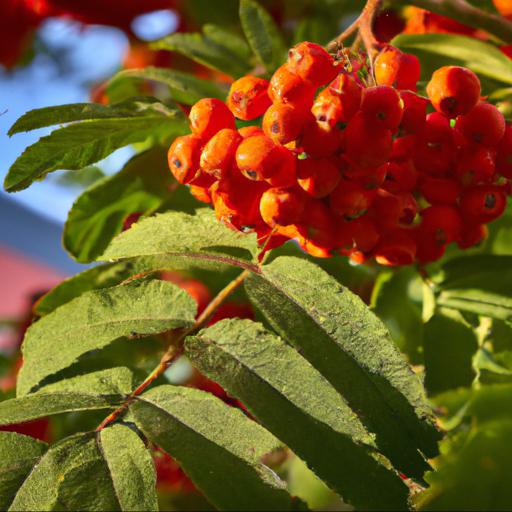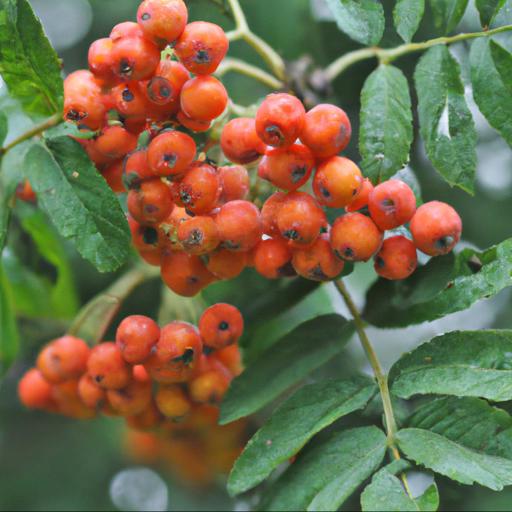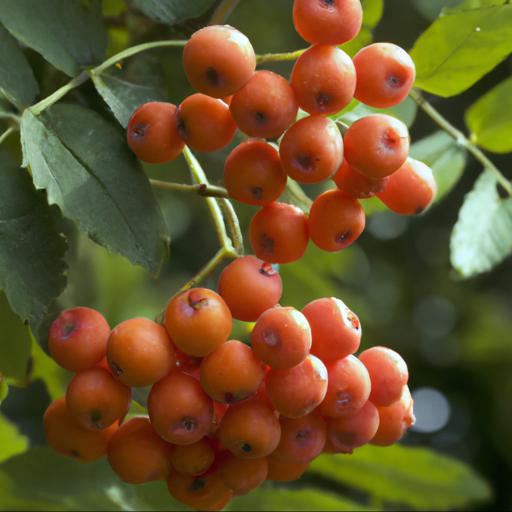Sorbus aucuparia, commonly known as the European rowan, is a deciduous tree native to Europe and parts of Asia. It is a member of the Rosaceae family and is an important food source for many species of birds and mammals. The tree is also widely cultivated for its attractive foliage, edible fruit, and strong timber.
In this blog, we will explore the many benefits of Sorbus aucuparia, including its uses in landscaping, traditional medicine, and modern cuisine. We will also discuss the challenges of growing and caring for this species, as well as its potential for conservation.
Finally, we will examine the various ways in which Sorbus aucuparia can be used to create a beautiful, sustainable landscape.
Benefits of sorbus aucuparia

As a UK garden expert, I can confidently say that the Sorbus aucuparia, commonly known as mountain-ash, is a wonderful addition to any garden. Not only is mountain-ash an interesting and aesthetically pleasing shrub, but it has a range of practical benefits which make it popular among gardeners. From a visual standpoint, Sorbus aucuparia is a deciduous species that is known for its bright yellow and pink foliage, often seen in the fall prior to leaf drop.
In addition, it produces clusters of vibrant cream colored flowers in the spring followed by round, red berries that attract beneficial birds and pollinators to your garden. Uses for Sorbus aucuparia are myriad.
It can serve as either a colourful ornamental shrub or a useful hedging plant, providing an effective barrier for businesses and homes. Additionally, the leaves and berries are edible, making it an attractive addition for foragers and kitchen gardens.
Furthermore, it is an excellent habitat for wildlife and is a tolerant species that can withstand harsh environmental conditions. With its impressive ability to thrive in both moist or dry soils, mountain-ash is an ideal choice for those looking to create a multi-dimensional garden. In conclusion, Sorbus aucuparia offers many benefits in addition to its attractive looks, making it an excellent choice for any UK garden expert to recommend.
Its aesthetic beauty, value as a hedging plant and potential practical uses make it an excellent candidate for any garden.
Growing and caring for sorbus aucuparia

As a UK garden expert, I recommend the Sorbus aucuparia for those looking for an attractive and interesting addition to their garden. Also known as the European Mountain Ash and Rowan tree, the Sorbus aucuparia is a deciduous species that is sure to bring life to your garden. The Sorbus aucuparia is an easy tree to look after; whilst it requires some basic maintenance, it is relatively fuss-free.
During the spring and summer, it will require water, including strategic irrigation and mulching and during the fall and winter, use of an organic fertilizer and suitable pruning is critical if you wish to maintain its beauty. Furthermore, it is essential to ensure that each winter the tree is adequately protected from any frost as this can be damaging if extreme.
The Sorbus aucuparia is a great choice if you are looking to attract wildlife to your garden. Its deep green foliage and abundance of berries make it a perfect habitat for birds.
In the autumn, the foliage turns a beautiful shade of yellow and orange, whilst clusters of white flowers appear in the spring followed by clusters of red berries in the summer, ensuring that colour and life is injected into your garden all year round. These are just some of the benefits of planting a Sorbus aucuparia in your garden; it is a beautiful, hardy addition that will bring life to your outdoor space for years to come. A perfect choice for any home.
Uses of sorbus aucuparia

One of the most spectacular trees in the UK countryside is the Sorbus aucuparia, also known as the rowan, European mountain ash, or quickbeam. This majestic tree is a member of the Rosaceae family and is native to the UK and other parts of Europe.
The Sorbus aucuparia is an extremely popular ornamental tree, due to its attractive white flowers in springtime and bright red berries in autumn. It is also a very hardy tree, which can tolerate wide variations in soil type, climate and moisture levels. The Sorbus aucuparia is a great asset to the UK gardens and gardens with a strong wildlife interest.
It provides an attractive backdrop for most plants, providing an attractive display of their small white flowers throughout the spring months. In the autumn months, the bright red color of the berries provides an attractive addition to any garden. Not only are the flowers and berries aesthetically pleasing, but the leaves of the tree are often used medicinally to help treat ailments such as colds, flus and skin irritations.
The Sorbus aucuparia is also an excellent choice for bird-friendly gardens as its berries provide a vital source of food for a variety of birds, including blackbirds and thrushes. As well as providing food, the Sorbus aucuparia is a habitat for a variety of species of moths and other insects which are often a key part of the local ecology.
Its dense foliage also provides a safe haven for birds to breed and roost. Additionally, the Sorbus aucuparia is often used in hedgerows, as it is a fast-growing tree that provides shelter and a habitat for numerous species of wildlife. In conclusion, the Sorbus aucuparia is a fantastic addition to any UK garden or outdoor space, providing visual interest and a habitat for a wide variety of wildlife species.
Its flowers, fruits and leaves all have beneficial qualities which make it a wonderfully diverse and practical tree. With its hardiness and decorative appeal, it is a real asset to any garden and its abundant fruits are a welcome addition to any wildlife garden!
Interesting facts about sorbus aucuparia
Sorbus aucuparia, otherwise known as the European mountain ash or rowan tree, is a species of flowering plant in the rose family. Native to Europe, Asia and Northwest Africa, this species of tree is a popular choice for gardens, as it adds a unique aesthetic to any landscape. With its distinctive twisted trunk and smooth bark, the Sorbus aucuparia adds height and texture to any garden setting.
In addition to its ornamental properties, the Sorbus aucuparia also offers its fair share of interesting facts. For example, it is an important source of food and shelter for many species of birds.
During the winter months, feathered visitors to the garden, such as the mistle thrush, rely on the tree’s berries for sustenance. Additionally, its characteristic autumnal foliage of yellow and orange hues is a visual feast, delighting gardens everywhere. In folklore, the Sorbus aucuparia was also believed to be a sign of good luck.
In Scotland especially, it was seen as a protective tree, as it was said to ward off witches. It was also believed that the tree bore magical healing properties, which may be due to its bark being used in traditional medicine in the past.
The Sorbus aucuparia is certainly an eye-catching tree, with its unique characteristics making it the perfect addition to any garden. With its unique features, bounty of folklore and wildlife attraction, it is no surprise that this species of tree has become a popular garden choice.
Final Touch
Sorbus aucuparia, commonly known as the Rowan Tree, is a species of deciduous tree native to Europe, Asia and parts of North Africa. It is a popular ornamental tree and is also used for its edible fruits, which are known as rowan berries.
The tree can reach heights of up to 15m, and is tolerant of a variety of soil types. The leaves are pinnate and the flowers are white or pale pink. The fruits are small and red, and can be used to make jams and jellies.
The Rowan Tree is a hardy and attractive tree, making it a great addition to any garden.
FAQ
What is the scientific name of Sorbus aucuparia?
The scientific name of Sorbus aucuparia is Pyrus aucuparia.
What are the common names of Sorbus aucuparia?
Common names of Sorbus aucuparia include European mountain ash, rowan, and quickbeam.
Where is Sorbus aucuparia native to?
Sorbus aucuparia is native to Europe, Asia, and parts of North Africa.
What are the uses of Sorbus aucuparia?
Sorbus aucuparia, commonly known as rowan, is a deciduous tree with a wide range of uses. It is often used for ornamental purposes, as its white flowers and bright red berries make it a popular choice for landscaping. The berries can also be used to make jams, jellies, and wines. The wood is also used for furniture, tool handles, and even musical instruments.
What are the health benefits of Sorbus aucuparia?
Sorbus aucuparia, also known as rowan, has many health benefits. It is rich in antioxidants, which can help protect the body from free radical damage and reduce inflammation. It is also a good source of vitamins A, C, and E, which can help boost the immune system and protect against infection. Additionally, Sorbus aucuparia can help reduce cholesterol levels, improve digestion, and reduce the risk of certain cancers.
How can Sorbus aucuparia be propagated?
Sorbus aucuparia can be propagated by seed, cuttings, or layering.

